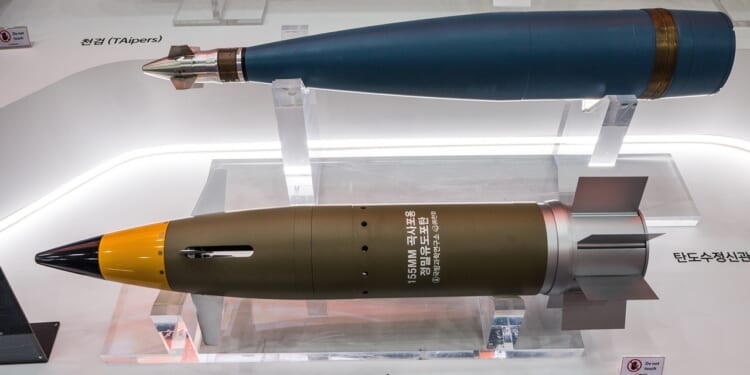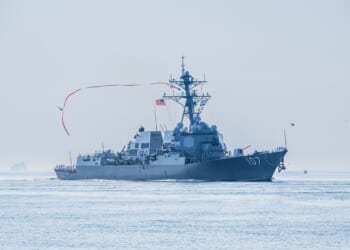Seoul’s sudden interest in advanced anti-ship artillery appears to be linked to heavy North Korean naval investments.
South Korea continues its march toward becoming a major weapons producing and exporting dynamo. This time, South Korea is producing 76mm Armor-Piercing High-Explosive (APHE) naval shells. The round is built to pierce a ship’s hull, and then detonate inside using a delayed/impact-delay fuze, rather than detonating on contact as a conventional high explosive (HE) round would. This increases internal damage and lethality against small and medium-sized warships.
The round was developed domestically by the South Korean ammunition maker, Poongsan. The Defense Acquisition Program Administration (DAPA) is managing procurement and production planning. The ammunition is meant for 76mm guns already fitted to South Korean fast attack craft and patrol boats, specifically the Yoon Youngha-class PKG and the Chamsuri-class PKMR (fast patrol boats).
The Background on South Korea’s Anti-Ship Gun Development
Beginning in 2019, by 2023 the round had completed operational trials. In November of that year, it received a “suitable for combat” (operationally fit) judgment. Mass-production was approved by the Defense Acquisition oversight a year later, in 2024, and DAPA planned to sign production contracts this year—with first deliveries being made to the Republic of Korea (ROK) Navy by 2026.
In October of this year, South Korea began full-scale production of the ammunition. This program is valued at $30.8 million covering production through 2028.
A 76mm APHE lets small, fast coastal combatants punch well above their weight when it comes to fighting larger hulls and armed vessels operating in the waters around the Korean Peninsula. Producing the APHE at home reduces reliance on foreign suppliers for specialized naval munitions and speeds sustainment for coastal fleets.
North Korea is the reason behind South Korea’s decision to ramp up their production of weapons. Seoul has found that the military balance of power is unexpectedly shifting toward North Korea’s favor—especially as Pyongyang has become a major cog of industrial-scale weapons and personnel support for Russia’s war in Ukraine.
As North Korea’s relationship with Russia has strengthened, it has benefited greatly. One of the things that has transpired has been for Russia to share high-end military technologies with North Korea.
Why Is South Korea Suddenly Interested in Naval Warfare?
As a result, South Korea has found itself in an untenable position militarily. Therefore, Seoul is doubling-down on its commitment to both indigenizing its arms industry and expanding it. The APHE naval shell production is but one of many examples of how South Korea is desperately trying to expand its arsenals, indigenize its armaments sector (so that it doesn’t need to rely upon foreign weapons with supply chains that North Korea could disrupt), and how Seoul is trying to modernize its force.
Meanwhile, the focus on naval power is key. That’s because, while Seoul has long taken for granted its superiority on the high seas, North Korea has enhanced its funding for its own naval development. There have, of course, been setbacks for a nascent naval power, like North Korea, the fact remains that Pyongyang is committed to projecting power across the waters nearest to the Korean Peninsula.
Therefore, the South Koreans must respond and be able to reliably deter the North Koreans. That’s where production of a weapon, such as the 76mm APHE round, comes into play.
Make no mistake: the South Koreans must produce weapons like this if they are to ensure their national sovereignty and security. North Korea is feeling its oats, as the Russians and Chinese have both aligned more fully with Pyongyang. If South Korea doesn’t enhance its capabilities indigenously, it just might find itself on the losing end of an irredentist North Korean neighbor.
About the Author: Brandon J. Weichert
Brandon J. Weichert is a senior national security editor at The National Interest. Recently, Weichert became the host of The National Security Hour on America Outloud News and iHeartRadio, where he discusses national security policy every Wednesday at 8pm Eastern. He is also a contributor at Popular Mechanics and has consulted regularly with various government institutions and private organizations on geopolitical issues. Weichert’s writings have appeared in multiple publications, including The Washington Times, National Review, The American Spectator, MSN, and the Asia Times. His books include Winning Space: How America Remains a Superpower, Biohacked: China’s Race to Control Life, and The Shadow War: Iran’s Quest for Supremacy. His newest book, A Disaster of Our Own Making: How the West Lost Ukraine is available for purchase wherever books are sold. He can be followed via Twitter @WeTheBrandon.
Image: Shutterstock / Flying Camera.

















